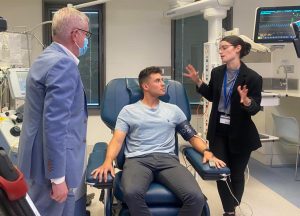A significant share of a $1.25 million worth of research grants from The Hospital Research Foundation Group has gone to CALHN researchers to improve outcomes for those living with heart disease.
Preventing heart attacks
People with diabetes have a high risk of repeat heart attacks due to the build-up of fatty plaque blocking their arteries.
Associate Professor Peter Psaltis and colleagues will investigate an injectable medicine called semaglutide (used to lower blood sugar levels in diabetes) to see if that stops plaque growth and prevent heart attacks from reoccurring.
Preventing readmissions
One in five people hospitalised for a heart attack return to hospital within 30 days and usually have poor outcomes.
Dr Clementine Labrosciano and colleagues hope to produce a model to help identify patients at high risk of readmission after a heart attack.
Angina
People with ANOCA (Angina with Non-Obstructive Coronary Arteries) experience immense chest pain and have limited therapies available to them.
Dr Sivabaskari Pasupathy and colleagues will investigate whether zinc supplements are a possible option to alleviate chest pain in ANOCA patients.
Patient management
There are limited tools for doctors to monitor patients between appointments.
Dr Johan Verjans and colleagues hope to create a unique dashboard to enable better insights into cardiology patients’ health and risk using real-time clinical and medication data. This will enable doctors to track patients, prevent errors and avoid unnecessary admissions.
Atrial Fibrillation (AF)
Catheter ablation is a procedure to help manage AF where flexible tubes are inserted through the veins or arteries to restore a regular heartbeat.
Dr Adrian Elliott and colleagues will evaluate whether patients undergoing this procedure have better outcomes if they also undertake exercise-based rehabilitation.



